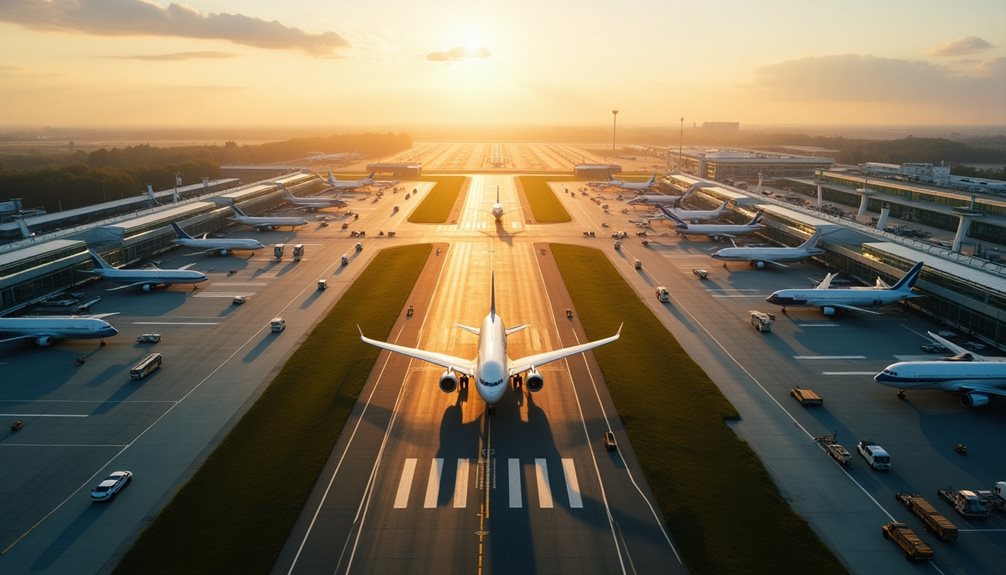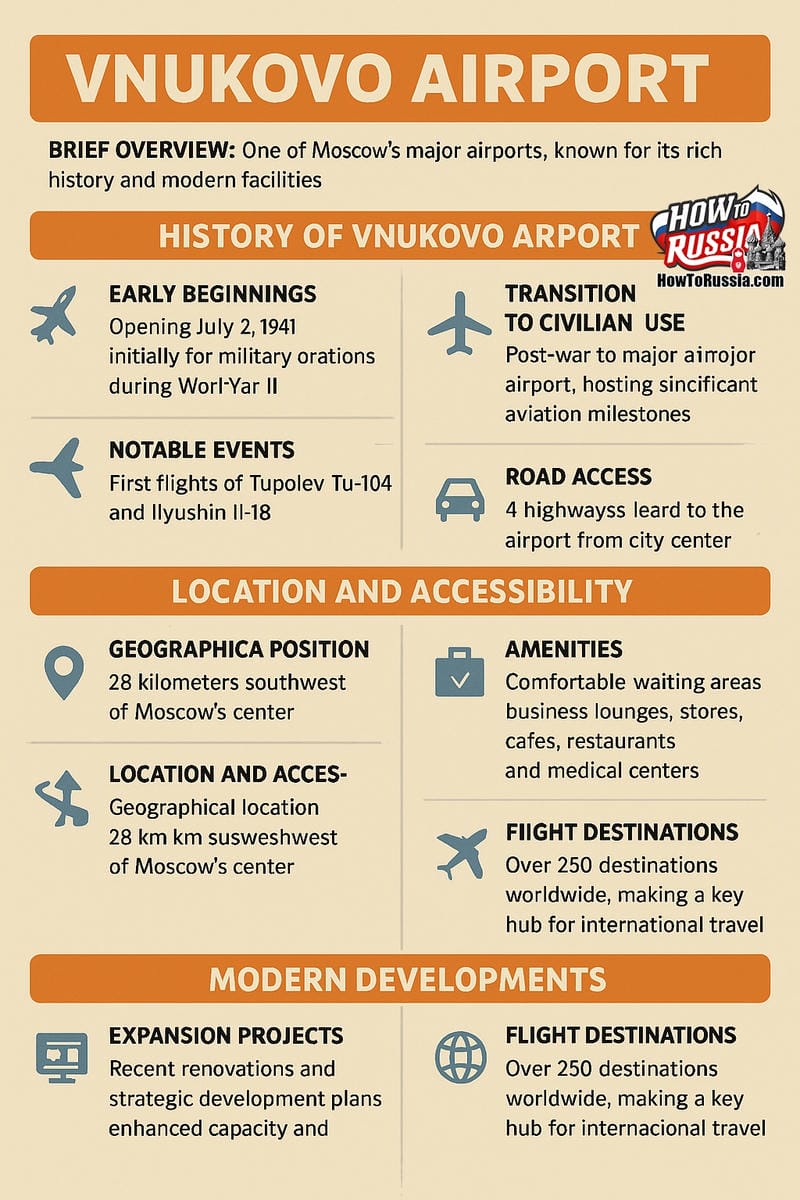Vnukovo Airport stands as a symbol of the evolution of aviation in Moscow. Established in the early 20th century, it has undergone significant transformations, adapting to the demands of modern travel. With its extensive network of over 250 global destinations, the airport plays an essential role in international connectivity. However, the story of Vnukovo is not just about its facilities and services; it reflects a deeper narrative of resilience and innovation in the aviation sector.
Introduction

Vnukovo International Airport, situated 28 kilometers southwest of central Moscow, is one of the city’s four major aviation hubs. Established in 1932, it holds the distinction of being Moscow’s oldest operating airport and has evolved into a modern facility that serves millions of passengers annually. In 2019, Vnukovo set a record by handling over 24 million travelers, solidifying its position as the third-busiest airport in Russia and the Post-Soviet region.
The airport is renowned for its strategic location and accessibility. It is the only Moscow airport directly connected to the city via the metro, with the Vnukovo station on the Solntsevskaya line opening in 2023. Additional transport links include express rail services to Kiyevsky Rail Terminal, highways, and even helicopter services, ensuring seamless connectivity for passengers.
Vnukovo boasts state-of-the-art facilities, including two passenger terminals (Terminal A and Terminal B), a VIP lounge, and Vnukovo-3, which caters to private and government flights. Its amenities range from comfortable lounges and dining options to shopping areas, conference rooms, and children’s play zones. The airport also features advanced infrastructure such as intersecting runways capable of handling large aircraft like the Airbus A380.
Historically, Vnukovo played a pivotal role during World War II as a base for military operations. Over decades, it has hosted significant events, including flights for Russian top officials and foreign dignitaries. In 2019, it was officially named after Andrei Tupolev, a legendary aircraft engineer.
Looking ahead, Vnukovo continues to expand with plans for terminal upgrades and increased flight capacity. These developments aim to enhance passenger experience while maintaining its status as an essential gateway connecting Moscow to domestic and international destinations.

Vnukovo: Moscow’s Gateway to the World
Moscow’s Vnukovo Airport functions as a vital transportation hub, seamlessly linking the capital with various destinations across Russia and the globe. Its transportation significance is underscored by facilitating global connectivity, enabling travelers to explore diverse cultures and economies.
The airport’s robust infrastructure supports substantial economic impact, generating jobs and stimulating local businesses.
Furthermore, Vnukovo plays an essential role in tourism facilitation, attracting visitors enthusiastic to experience Russia’s rich heritage. This connectivity not only enhances regional development but also fosters an environment of growth and opportunity, reinforcing Moscow’s status as a key player in international aviation.
The Evolution of Vnukovo Airport
Established in 1932, Vnukovo Airport began as a modest airfield, reflecting the early stages of aviation development in Russia. Its construction was approved to alleviate congestion at the Khodynka Aerodrome, marking the start of its journey as a key player in Moscow’s aviation landscape.
World War II Contributions
In July 1941, amidst the turmoil of World War II, Vnukovo transitioned from civilian operations to serve as a military base. It became a vital logistical hub, supporting troop transport and cargo deliveries to critical battlefronts such as Sevastopol and Stalingrad. Notably, Vnukovo pilots played a crucial role in delivering the German Act of Surrender to Moscow in May 1945, highlighting its wartime significance.
Post-War Transformation
Following the war, Vnukovo returned to civilian use and was designated Moscow’s primary airport in 1945. This shift marked the beginning of modernization efforts that transformed it into a leading aviation hub. By 1946, air groups for domestic and international flights were established, laying the groundwork for its future growth.
Aviation Milestones
Vnukovo has been at the forefront of aviation advancements. It hosted significant first flights, including the Tupolev Tu-104 jetliner in 1956 and the Ilyushin Il-18 long-range aircraft in 1956. These milestones underscored its role as a testing ground for innovative aircraft designs that shaped commercial air travel.
Modernization and Expansion
The airport underwent extensive renovations during the late 20th century, including preparations for the 1980 Moscow Olympics with new terminal construction. In the early 2000s, strategic development plans introduced modern terminals and infrastructure upgrades, such as express rail links to Kiyevsky Rail Terminal and expanded passenger facilities.
Economic and Cultural Impact
Vnukovo’s operations have significantly contributed to Moscow’s economy by facilitating trade, tourism, and connectivity. It has served as a gateway for global visitors and dignitaries while maintaining its status as one of Russia’s busiest airports. As of 2024, it ranks third among Russian airports in passenger traffic.
Accessibility and Transportation

Strategic Location
Vnukovo Airport is situated approximately 28 kilometers southwest of Moscow’s city center, making it the closest of the city’s major airports. This prime location enhances its accessibility for both domestic and international travelers, positioning it as a vital part of Moscow’s transportation network.
Transportation Options
The airport offers a range of transportation services to ensure convenient access:
- Express Rail Service: A high-speed rail link connects Vnukovo to Kiyevsky Rail Terminal in central Moscow, allowing passengers to travel quickly and comfortably.
- Metro Access: The opening of the Solntsevskaya metro line in 2023 further improved connectivity, providing direct access to the airport from Moscow’s metro system.
- Road Connections: Four major highways lead directly to Vnukovo, complemented by clear signage that facilitates smooth navigation for both private vehicles and public transport.
- Shuttle Buses and Taxis: Regular bus services and taxis cater to passengers seeking alternative transport options.
Traffic Management Challenges
Despite its strategic location, traffic congestion during peak travel times can pose challenges for timely arrivals. To address this, Vnukovo employs advanced traffic management strategies, including optimized road layouts and real-time monitoring systems, ensuring smoother transit for passengers.
Proximity Benefits
The airport’s close proximity to Moscow allows for swift access not only to the city but also to surrounding regions. This advantage bolsters its role as a critical hub for ground transport services, supporting regional connectivity and enhancing travel efficiency.
Environmental Considerations
While its geographical position offers numerous benefits, growth in passenger traffic raises concerns about environmental impact. Efforts are underway to balance expansion with sustainability, ensuring that Vnukovo remains an eco-conscious transportation hub.
Integrated Transport Solutions
Vnukovo’s continuous infrastructure improvements reflect its commitment to modernizing transportation systems. The integration of express rail services and metro connections has significantly enhanced commuter convenience, making it one of Russia’s most accessible airports.
By combining strategic location, diverse transportation options, and effective traffic management, Vnukovo Airport stands as a model of efficient connectivity within Moscow’s aviation landscape.
Airport Facilities
Vnukovo Airport offers a comprehensive range of facilities designed to enhance the passenger experience. Exclusive lounge access provides a tranquil retreat for weary travelers, while diverse dining options cater to various tastes, from quick bites to gourmet meals. The shopping experience is equally compelling, featuring luxury brands and local souvenirs. Efficient transportation services ensure seamless connections to the city and beyond.
Terminal Operations
Vnukovo primarily operates through Terminal A, which accommodates a wide range of passenger flights. This modern hub features streamlined processes and attentive staff, ensuring an efficient experience. VIP lounges offer a luxurious retreat for those seeking privacy and comfort. Dedicated terminals cater to business aviation and official delegations, providing an exclusive atmosphere. Airport security is a top priority, ensuring all travelers feel safe and secure.
Amenities and Services
Travelers at Vnukovo are greeted with an array of amenities that enhance their experience. Comfortable waiting areas and exclusive lounge access prioritize passenger comfort. A diverse selection of dining options and retail shops cater to varied tastes and needs. Wellness facilities, including medical centers, ensure health needs are promptly addressed. This thoughtful combination of services transforms Vnukovo into a destination that embodies freedom and convenience.
Runways and Capacity
Vnukovo is equipped with two modern runways capable of managing a high volume of air traffic, handling up to 58 takeoffs and landings per hour. Advanced runway maintenance practices guarantee peak performance and safety. Refined air traffic management systems enhance flight scheduling efficiency, minimizing delays even during peak times. Technological advancements and environmental impact assessments guide sustainable practices, positioning Vnukovo as a significant hub in contemporary aviation.
Advancements in Passenger Experience
Vnukovo Airport has implemented modern technologies to streamline operations and enhance the passenger experience. Automated check-in systems reduce wait times, while biometric screening and advanced surveillance ensure security without compromising convenience. Sustainability initiatives, such as energy-efficient systems and waste reduction strategies, demonstrate the airport’s commitment to environmentally responsible practices.
Expansion Projects and Infrastructure
Ongoing expansion projects at Vnukovo are transforming its capacity and services. Renovations have upgraded terminals and modernized facilities, enabling smoother passenger flow and reducing delays. The addition of new transport links, including metro access via the Solntsevskaya line, further boosts accessibility for millions of travelers. These developments reflect Vnukovo’s strategic vision to remain a competitive global aviation hub.
Global Connectivity
Vnukovo Airport has evolved into a vital hub connecting Moscow to over 250 destinations worldwide. Its extensive network, bolstered by partnerships with numerous airlines, ensures competitive pricing and diverse travel options for passengers.
Seasonal routes further enhance its appeal, offering exciting opportunities for exploration during peak travel times. Beyond its connectivity, Vnukovo boasts a rich history, having served as a military base during World War II and hosting iconic moments such as Yuri Gagarin’s return from his groundbreaking spaceflight in 1961.
Today, Vnukovo continues to honor its legacy through innovation and service excellence. Its modern amenities, such as exclusive lounges, diverse dining options, retail shops, and wellness facilities, transform it into more than just a transit point—it becomes a destination in itself.
As the airport undergoes expansion and modernization efforts, it remains committed to sustainability, passenger convenience, and global connectivity. This blend of tradition and progress ensures Vnukovo’s status as one of Russia’s premier aviation hubs and a gateway that embodies the freedom and excitement of air travel.





